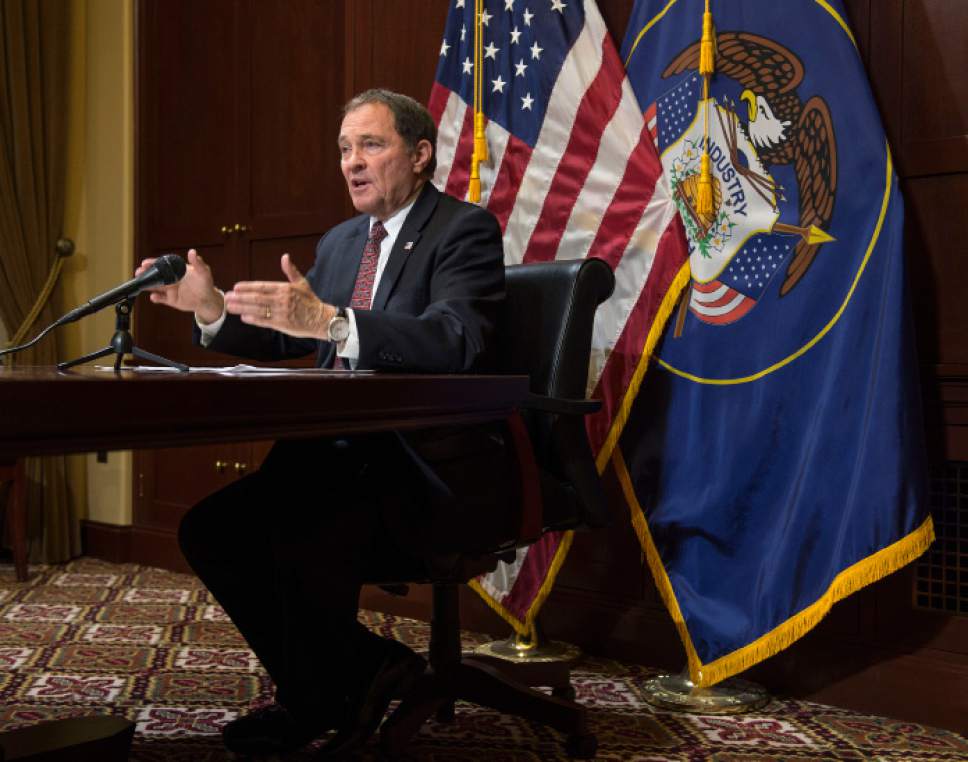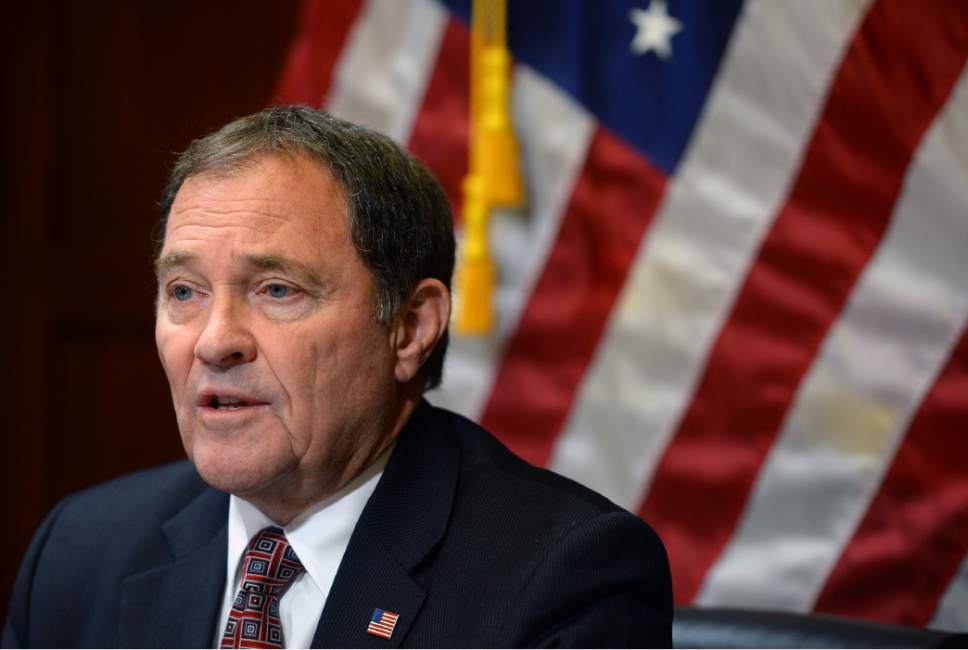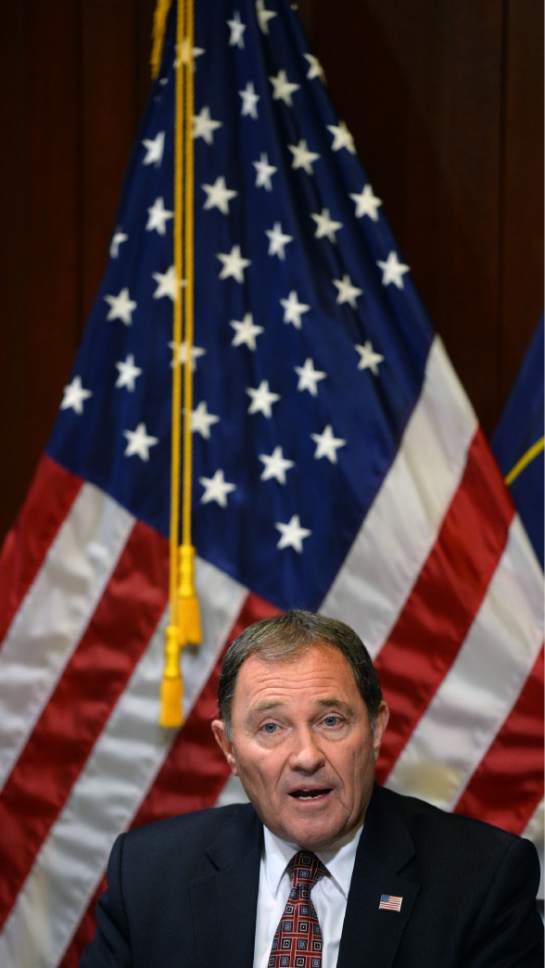This is an archived article that was published on sltrib.com in 2017, and information in the article may be outdated. It is provided only for personal research purposes and may not be reprinted.
Gov. Gary Herbert is pushing back against threats by outdoor retailers to move their huge twice-a-year conventions out of Utah, calling the controversy a "political ploy" that ignores massive efforts by the state to protect public lands and public access to them.
"I think the accusation that we are, in fact, trying to take away access to public lands … does not stand up under scrutiny," Herbert told reporters Thursday before he ticked off a list of projects and programs he says help preserve wildlands and access.
Herbert's remarks come in response to news that the Outdoor Industry Association is exploring moving from Utah because many retailers are unhappy with Utah leaders' stands on possibly privatizing lands and fighting to eliminate the Bears Ears National Monument and shrink the Grand Staircase-Escalante monument.
"The overriding theme," association Executive Director Amy Roberts said, "is a disagreement over keeping public lands public, and we really see that as a foundational issue for our industry."
One major retailer, Patagonia, said it would boycott shows as long as they remain in Utah because of elected leaders' relentless campaign to erase the new Bears Ears National Monument.
Patagonia was joined Thursday by Arc'teryx, a Canadian outerwear and equipment company that announced its withdrawal from the Salt Lake City Outdoor retailers events "due to the state's efforts to rescind protection of Bears Ears National Monument and other public lands."
Company President Jon Hoerauf said some $150,000 the company would have spent on the conventions will be reallocated over three years to a Public Lands Defense Fund.
Herbert was among the chorus of all-Republican statewide and congressional leaders to decry in the strongest language the creation of Bears Ears National Monument by outgoing President Barack Obama in December. A resolution calling for the Trump administration to rescind the monument flew through the Legislature in record time and was quickly signed by the governor.
But Herbert said comments from some of the outdoor retailers show they may not realize all that Utah does for their industry, and called for a meeting with them.
"This ought not to be a discussion carried on through the media," he said. "So I am asking my staff to reach out to the Outdoor Retailers Association and all those who are involved to have a meeting with me at the earliest opportunity where we can discuss the issues."
He added, "I notice misrepresentation and misunderstanding. We need to sit down face to face … and see what their concerns are, and if we can address them. I understand their apprehension and their concern, but I think we have answers to their questions."
When asked what he thought of trying to influence Utah policy through a boycott or threats to move the shows, Herbert said, "It is a political ploy we see."
He added, "I would like to see if we could take the politics out of this issue. This debate has been going on for the last 100 years on public lands."
He said Utah is seeking an optimal balance between protecting some public lands, and allowing ranching, farming, mining and other development on others where appropriate.
Herbert defended possible use of lawsuits to seek state control over federal lands when needed, saying it is one of three arrows in the state's quiver to find a balance on public lands along with negotiation and congressional legislation.
"We're trying to be good stewards of the land," Herbert said. "We're trying to provide access to public lands for those who want to enjoy them."
He listed evidence that Utah is friendlier to public lands than retailers may think.
"We were the first state in America to have an outdoor recreation office, where we have been working with the Outdoor Retail Association and others to say, 'What can we do to foster and improve outdoor recreational activities?"
Utah has the largest watershed and wildlife habitat restoration program in the county, the governor said and spends more each year on it than the next two or three Intermountain states combined.
"Six current and three proposed projects, over 9,000 acres in size, are guess where? The Bears Ears region," he said.
He noted that when the federal government shut down in 2013, the state paid to reopen national parks here, primarily because of complaints of lost business and revenue to local economies.
"On our own we developed a plan in the state to protect the sage grouse habitat," he said. "We had a program without any federal mandate that allows us to protect 94 percent of the sage grouse habitat here in the state of Utah."
He also took a shot at Colorado, where Gov. John Hickenlooper has said his state would be a better home for the outdoor shows. "The convenience of our public lands is unparalleled. And we have twice as much, as say, our neighbor to the east, Colorado. We have many more public lands here to access much more conveniently."
The outdoor retailer summer and winter shows have been in Salt Lake City since 1996. They draw an estimated 25,000 attendees, delivering an annual economic impact of about $45 million.







